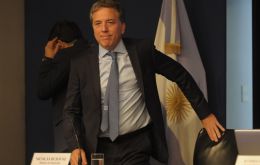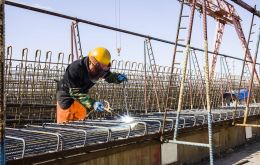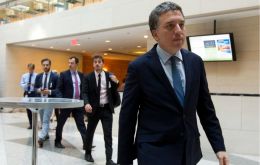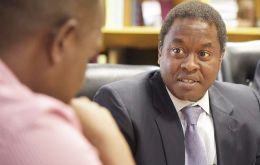MercoPress. South Atlantic News Agency
Tag: International Monetary Fund
-
Saturday, January 19th 2019 - 09:13 UTC
Argentina complies with IMF 2018 primary fiscal deficit target: 2.4% of GDP

Argentina outperformed its primary fiscal deficit target for 2018, Economy Minister Nicolas Dujovne said on Friday, assuring that the country’s standby finance deal with the International Monetary Fund remains on track.
-
Friday, January 18th 2019 - 10:04 UTC
Wholesale prices in Argentina reach 73.5% in 2018; Peso rallies 10% in the midst of recession

Wholesale prices in Argentina shot 73.5% higher in 2018, government data showed on Thursday, the fastest rate since 2002 when they climbed 118% during an economic crisis that tossed millions of middle-class Argentines into poverty.
-
Thursday, December 20th 2018 - 09:20 UTC
IMF Executive Board approves US$7.6 billion disbursement for Argentina

The Executive Board of the International Monetary Fund (IMF) completed on Wednesday the second review of Argentina’s economic performance under the 36-month Stand-By Arrangement (SBA) that was approved on June 20, 2018.
-
Wednesday, December 19th 2018 - 09:20 UTC
Argentina officially in recession: economy sinks 3.5% in third quarter

Argentina is in recession after its economy shrank by 3.5% during the third trimester of 2018, the state statistics bureau said on Tuesday. It was the second such shrinkage in a row after the economy shrank 4.0% in the second quarter, with respect to the same period a year ago.
-
Thursday, December 6th 2018 - 08:45 UTC
Argentine manufacturing and construction declines during October

Manufacturing in Argentina fell 6.8% in October year on year, while construction declined 3.7%, and in the first ten months of this year 2.5% and 4.9% respectively according to the Indec statistics bureau report. Firms were hit hard by a contraction in economic activity and the devaluation of the Peso against the US dollar.
-
Tuesday, November 27th 2018 - 09:27 UTC
IMF praises Argentina's reforms program and anticipates rebound of activity in 2019

The International Monetary Fund has completed its second review of Argentina, the fund said on Monday, paving the way for the country to receive US$7.6 billion under a US$ 56.3 billion financing deal.
-
Tuesday, November 20th 2018 - 08:43 UTC
Venezuela preparing macroeconomic data to deliver to IMF

Venezuela which is sitting on one of the world’s largest crude oil reserves but which is suffering the worst loss of oil production in history outside of war-induced outages is getting ready to share macroeconomic data with the International Monetary Fund to avoid penalties including possible exclusion from the IMF.
-
Thursday, November 15th 2018 - 08:42 UTC
Argentina's Senate approves austerity budget agreed with IMF

After 13 hours of debate, the Argentine Senate approved the draft Public Administration Budget for 2019 early on Thursday. The project, presented by Mauricio Macri’s government, went ahead with 45 votes in favor, 24 against and just one abstention.
-
Saturday, October 27th 2018 - 09:38 UTC
IMF completes review of Argentina's stand-by loan; Lagarde praises performance

The Executive Board of the International Monetary Fund (IMF) completed on Friday the first review of Argentina’s economic performance under the 36-month Stand-By Arrangement (SBA) that was approved on June 20, 2018.
-
Wednesday, October 17th 2018 - 08:24 UTC
Jamaican economist will oversee Argentina's compliance of IMF accord

The International Monetary Fund has announced that Jamaican economist Trevor Alleyne will be the institution's representative in Argentina, after confirming it had decided to reopen an office in Buenos Aires, six years after leaving. The decision comes after Buenos Aires reached a deal with the IMF on the money supply, interest rates and an exchange rate framework.
